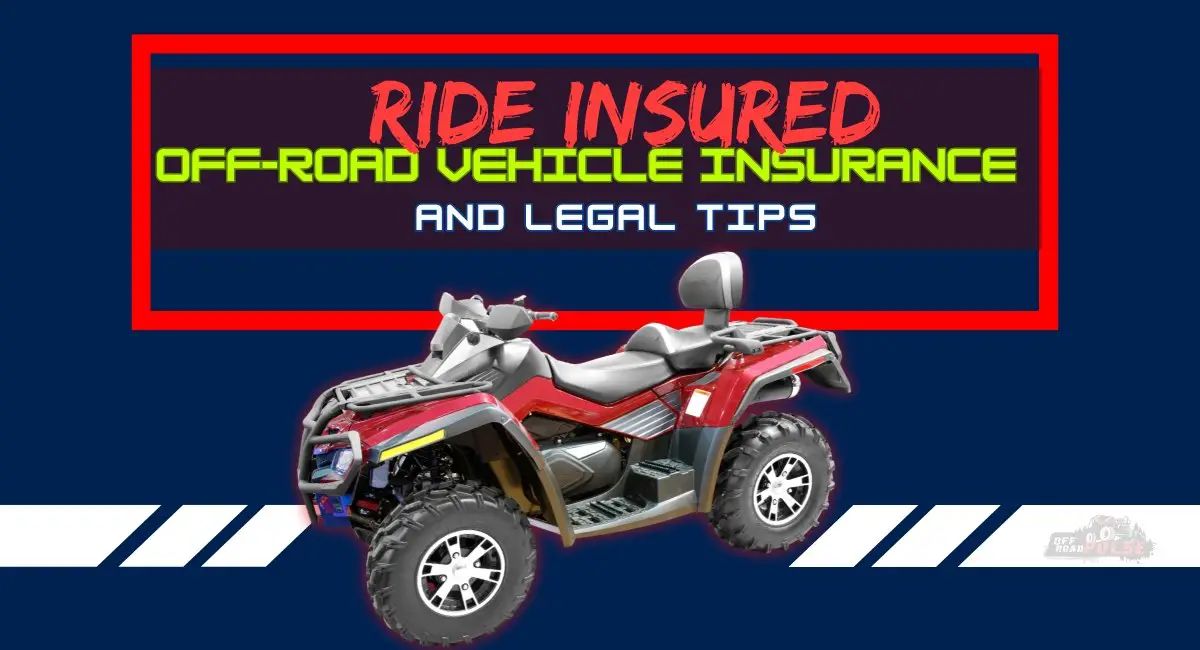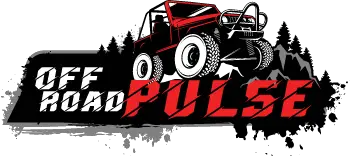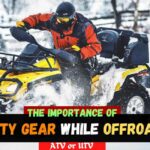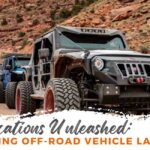Operating off-road vehicles entails legal considerations that riders must be aware of and comply with to ensure they are operating within the law. These legal requirements include insuring the vehicle, which varies by jurisdiction. Insurance coverage for ORVs is essential due to the inherent risks associated with off-road riding.
Ideally, the unpredictable terrain, high speeds, and challenging obstacles increase the likelihood of accidents and injuries. Without adequate insurance, riders are likely to face significant financial burdens in the event of an accident. ORV insurance offers peace of mind to riders by offering financial protection while enjoying their off-road adventures.
Importance Off-Road Vehicle Insurance
According to the U.S. Consumer Product Safety Commission (CPSC), there were 2,178 off-highway-related fatalities and injuries reported from 2017 to 2019, with a significant portion involving children and teenagers. These statistics underscore the importance of having adequate insurance coverage for off-road vehicles.
Accidents can happen unexpectedly, and the consequences can be severe, ranging from property damage to life-altering injuries and even fatalities. Besides, off-road environments pose unique risks that may not be adequately covered by standard auto insurance policies.
Generally, traditional policies often exclude coverage for off-road use or may provide limited protection for vehicles driven in non-standard conditions. Without specialized off-road vehicle insurance, ORV owners risk facing substantial financial losses in the event of accidents, injuries, or property damage.
The primary benefit of off-road vehicle insurance is its ability to provide comprehensive coverage tailored to the specific needs of off-road riding. These policies typically offer a range of coverage options, meaning off-roaders can ensure they are protected adequately against the risks associated with off-road riding.

What is Off-Road Vehicle (ORV) Insurance?
Off-road vehicle (ORV) insurance is a specialized type of insurance coverage designed to protect off-road vehicles and their owners against various risks associated with off-road riding. It provides financial protection in the event of accidents, damage to the vehicle, theft, liability for injuries or property damage to others, and other incidents that may occur while operating an ORV.
You can purchase ORV insurance from various insurance companies that specialize in recreational vehicle insurance. Additionally, some auto insurance companies may offer ORV coverage as an add-on to existing policies. That said, it is always a good idea to shop around and compare quotes from multiple insurers to find the best coverage and rates for your specific needs.
Types of Off-Road Vehicle Coverage
Collision Coverage
Collision coverage is a type of insurance that protects your off-road vehicle in the event of a collision with another vehicle or object, regardless of who is at fault. It typically covers the cost of repairing or replacing your vehicle if it’s damaged in such an accident.
Comprehensive Coverage
Comprehensive coverage provides protection for damages to your off-road vehicle caused by events other than collisions. It extends protection beyond accidents involving collisions to include occurrences such as theft, vandalism, fire, or natural disasters.
Liability Insurance
Liability insurance offers financial protection if you’re deemed responsible for injuring someone else or damaging their property in an off-road vehicle accident. This policy ensures that you’re financially equipped to compensate others for their injuries and related expenses.
Bodily injury liability coverage helps cover the medical expenses, lost wages, and legal fees of individuals injured in an accident where you’re at fault. On the other hand, property damage liability covers the costs of repairing or replacing the property of others that you’ve damaged in an accident. This can include vehicles, fences, buildings, or any other property that may be affected in an off-road accident.
Uninsured Motorist Coverage
Uninsured motorist coverage protects you if you’re involved in an accident caused by a driver who doesn’t have insurance or doesn’t have enough insurance to cover your damages. It covers expenses like medical bills and vehicle repairs if the at-fault party lacks adequate insurance.
Accident Benefits Coverage
Accident benefits coverage provides financial assistance for medical expenses, lost wages, and other related costs incurred by you and your passengers if you’re injured in an off-road vehicle accident, regardless of fault. This coverage ensures that you and your passengers receive prompt medical attention and support in the event of injuries sustained while riding your off-road vehicle.
Legal Requirements for Off-Roading
Riding an off-road vehicle is a popular hobby, but it comes with a set of legal requirements and responsibilities that riders must adhere to. Off-road regulation is important because it helps ensure the safety of riders and others while promoting responsible riding practices. Here’s a breakdown of some key legal considerations for off-roading;
Vehicle Registration and Insurance
In most places, off-road vehicles must be registered and insured just like any other vehicle. This ensures that the ORV meets safety standards and can be identified if involved in an accident.
Permits and Land Use Regulations
Off-roading is often restricted or prohibited in certain areas, such as national parks, wildlife preserves, or private property. Always check local regulations and obtain any necessary permits before off-roading in a particular area.
Environmental Regulations
Off-roading can have significant environmental impacts, such as soil erosion, habitat destruction, and pollution. Many areas have specific regulations in place to protect sensitive ecosystems. Off-roaders may be required to follow designated trails or avoid certain areas altogether.
Safety Equipment
Depending on the jurisdiction, off-road vehicles may be required to have several safety equipment, such as roll bars, seat belts, or helmets for occupants. These measures help protect occupants in the event of accidents and enhance overall off-road safety.
Noise Regulations
Off-road vehicles, particularly those with modified exhaust systems, can be noisy. Some areas have noise regulations that off-roaders must adhere to, especially if they are close to residential areas or wildlife habitats.
Alcohol and Drug Laws
Just like driving on public roads, off-roading under the influence of alcohol or drugs is illegal and can result in severe penalties. As such, it’s essential to prioritize safety and avoid alcohol or drug use before or during off-roading activities.
Trespassing Laws
Off-roaders should always respect private property rights and avoid trespassing on land where they do not have permission to ride. Trespassing can lead to legal consequences, including fines, citations, or even criminal charges.
Off-Road Vehicle Standards
Some jurisdictions have specific standards for off-road vehicles, particularly regarding modifications and aftermarket parts. Off-roaders should ensure that their vehicles comply with these standards to avoid legal issues.
Recovery and Rescue Regulations
Off-roaders should be aware of recovery and rescue regulations when venturing into remote areas. These may include notifying authorities in emergencies, minimizing environmental impact during recovery operations, and obtaining permission on private land.
Trail Etiquette and Respect for Others
It’s essential to respect other trail users, wildlife, and the environment, even when off-roading legally. This often entails following designated trails, yielding to other trail users, avoiding disturbing wildlife, and packing out all trash.
Legal Off-Roading Areas
Legal off-roading areas provide off-roaders with safe and legal environments to enjoy their hobby. These areas are typically managed by government agencies, private organizations, or landowners who have established trails and facilities specifically for off-road recreation. Legal off-roading areas include;
Public Lands
Many national forests, Bureau of Land Management (BLM) areas, and state parks designate trails and areas for off-highway vehicle use. These areas often have designated routes, trail systems, and facilities such as campgrounds and restrooms.
Off-Road Parks
Private off-road parks cater to off-road enthusiasts by offering a variety of trails, terrain, and amenities for recreational use. These parks may charge admission fees or require memberships, but they provide controlled environments for off-roading activities.
Motorsport Parks
Motorsport parks are dedicated facilities for motorsports enthusiasts, including off-road vehicles. These parks may feature tracks, obstacle courses, and other facilities for off-road racing, competitions, and recreational riding.
Private Property
Some landowners allow off-roading on their private property, either for personal use or as part of organized events or clubs. However, off-roaders must obtain permission from the landowner and adhere to any rules or regulations established by the property owner.
Designated Trails and Routes
Some jurisdictions designate specific trails, roads, or routes for off-highway vehicle use within public lands or forests. These trails are marked and maintained for off-road recreation to provide opportunities for legal riding in natural settings.
Off-Road Events
Off-road events, such as rallies, races, and organized rides, often take place in designated off-roading areas. These events are typically held with the proper permits and permissions from land management agencies or private landowners.
Tips for Choosing the Right Insurance
When selecting an off-road vehicle insurance policy, it’s crucial to consider several factors to ensure you have adequate coverage while also finding affordable rates. Key considerations include;
- Coverage limits- Evaluate the coverage limits offered by the insurance policy for liability, collision, comprehensive, and medical payments. Ensure the limits are sufficient to cover potential damages or injuries resulting from off-road accidents.
- Deductibles- Consider the deductible amounts for different types of coverage. A higher deductible can lower your premium but also means you’ll pay more out of pocket before the insurance kicks in.
- Exclusions- Review the policy’s exclusions to understand what situations or types of damage may not be covered. Common exclusions may include racing, intentional damage, or use of the vehicle for commercial purposes.
- Types of coverage- Determine which types of coverage you need based on how you plan to use your off-road vehicle. This may include liability coverage to protect against damages to others’ property or injuries, collision coverage for damage to your vehicle, and comprehensive coverage for non-collision events.
- Optional coverage- Explore optional coverage options such as uninsured/underinsured motorist coverage, roadside assistance, or coverage for aftermarket accessories or modifications.
- Discounts- Inquire about available discounts, such as multi-policy discounts for bundling your off-road vehicle insurance with other policies, or discounts for completing safety training courses.
- Read and understand policy terms- Carefully read and understand all terms and conditions of the insurance policy before purchasing. Pay attention to coverage limits, exclusions, and any additional fees or surcharges.
- Compare quotes- Obtain quotes from multiple insurance providers to compare coverage options and rates. Be sure to provide consistent information to each insurer for accurate comparisons.
- Review annually- Regularly review your off-road vehicle insurance policy to ensure it still meets your needs since your circumstances may change over time.
Steps to Take After an Off-Road Accident
Experiencing an off-road accident can be frightening and overwhelming. However, it’s essential to stay calm to ensure everyone’s safety and manage the situation effectively. Here are some steps you can take after an off-road accident;
- Seek medical attention- Examine yourself and others involved in the accident for injuries. If anyone is injured, call emergency services immediately. Seek medical attention promptly, even if injuries seem minor.
- Contact authorities- Report the accident to the police or relevant authorities, even if there are no injuries. These personnel can assist in documenting the incident, and you may need them for insurance claims.
- Document the scene- Take photos or videos of the accident scene, including any damage to vehicles or property, injuries, road conditions, and any other relevant details. Collect contact information from witnesses, if possible.
- Exchange information- Exchange contact and insurance information with the other parties involved in the accident. Include names, addresses, phone numbers, insurance policy numbers, and vehicle information.
- Report to insurance- Contact your insurance provider as soon as possible to report the accident. Provide them with all necessary information, including the police report and documentation of the accident scene.
- Follow insurance procedures- Follow the instructions provided by your insurance company for filing a claim. This may include completing claim forms, providing documentation, and cooperating with the claims adjuster’s investigation.
- Follow up- Stay in touch with your insurance company, healthcare providers, and any legal representatives involved in the process. Ensure that all necessary steps are taken to resolve the aftermath of the accident.
Conclusion
Insurance coverage is non-negotiable when it comes to safeguarding ourselves, our assets, and our financial well-being. Off-road vehicle insurance and legal compliance are paramount for enthusiasts to enjoy their off-roading adventures safely and responsibly. Adequate insurance coverage ensures financial protection in the event of accidents, injuries, or property damage. By doing so, we can rest assured knowing that we are prepared for whatever off-roading may throw our way.




